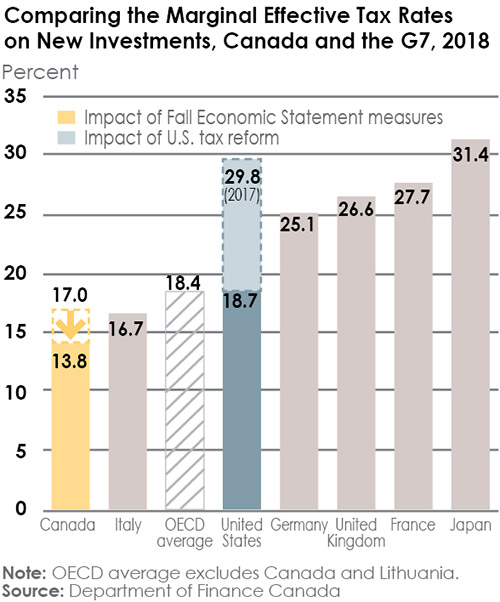Tech Innovators Find a Home for Invention and Growth in Canada
New incentives are making Canada an attractive place to invest.
Q4 2018

Something exciting is happening in Canada, and the whole world is playing a part. The country is emerging as the world’s leading technology incubator, sparking important advances from a range of companies and other institutions and attracting new investment from around the world as companies seek to take advantage of a supercharged innovation ecosystem.
Canada’s rich climate for research and development in technology stems from a diverse, highly educated workforce, enviable living conditions, and a business-friendly environment that includes a robust infrastructure, low business costs, ready access to international partners, and a commitment to collaboration and innovation. As a result, Canada’s tech sector is thriving and contributed $117 billion to the country’s economic output in 2017.
Canada’s dedication to R&D in technology starts with an array of incentives for large-scale industry partnerships. At the head of this effort is Invest in Canada, a federal investment promotion agency that brings together public and private partners to provide service to global investors exploring opportunities in the country. Ian McKay, CEO of Invest in Canada, says the entity acts as a world-class investor concierge service to ensure investors have access to the full spectrum of opportunities that Canada provides. “With diverse and highly skilled talent, access to large and growing markets, an inviting business climate and strong support for innovation, Canada has a value proposition that is as undeniable as it is compelling,” McKay says.
Canada’s economic development leaders understand the importance of incentives in helping companies pursue ambitious tech-based projects. For that reason, the country’s Scientific
Research and Experimental Development provides billions in tax credits and incentives to businesses conducting R&D in Canada. The SR&ED program eases the costs of product testing and software development, reducing some of the largest expenses of project development. The program allows investors to claim expenditures such as wages and salaries, contract expenditures, overhead, and materials.
Another integral program for R&D efforts is Canada’s Strategic Innovation Fund, which connects hundreds of projects to other programs and services. The fund focuses on large support requests of more than $10 million. The government’s recent economic update includes a commitment to increase funding for SIF by $800M over five years. In fact, the update includes several new write-offs that mean Canada will enjoy the lowest marginal effective tax rate in the G7, including the U.S.
Some of the world’s most forward-thinking companies are gravitating toward strategically located superclusters in Canada designed to foster intense business activity and innovation. The superclusters strengthen collaborative ties between private-sector, academic, and public-sector organizations and harness shared competitive advantages to spur the generation of new companies and the commercialization of new products. The strength-in-numbers approach places anchor firms and institutions alongside startups and government partners to create concentrated, vibrant, and prolific business communities.
Through strategic investments, Canada is supporting the business-led superclusters with the greatest potential to energize the economy and serve as engines of growth. Companies such as Microsoft, Cisco, General Electric, ABB, IBM, Siemens, Intel, and Thales are among the 450 businesses participating, alongside 60 postsecondary institutions and 180 other participants.
Canada especially has emerged as a pioneer in artificial intelligence, among the various technology-based fields. In 2017, Canada became the first country to launch a national artificial intelligence strategy. The five-year, $125 million Pan-Canadian Artificial Intelligence Strategy ensures Canada will be at the forefront of this rapidly evolving field by increasing the number of the country’s AI-focused researchers and graduates, establishing centers of scientific excellence, providing increased support to the AI research community, and developing global thought leadership on the myriad implications of AI.
Through these and other programs, Canada’s support for ambition and innovation promises to continue to accelerate the efforts of those individuals and organizations exploring and discovering new frontiers in technology and will inspire new partners from around the world to join them.
Project Announcements
US Forged Rings Plans Hertford County, North Carolina, Steel Component Operations
03/02/2026
South Korea-Based Hanjung America Plans Huntington, Indiana, Manufacturing Operations
03/02/2026
Faith Technologies Plans Opelika, Alabama, Manufacturing Operations
03/01/2026
TaylorMade Golf Expands Vanderburgh County, Indiana, Distribution Operations
03/01/2026
Sediver USA Expands West Memphis, Arkansas, Operations
03/01/2026
Carpenter Pole and Piling Expands Wiggins, Mississippi, Operations
03/01/2026
Most Read
-
Top States for Doing Business in 2024: A Continued Legacy of Excellence
Q3 2024
-
Speed Built In—The Real Differentiator for 2026 Site Selection Projects
Q1 2026
-
Preparing for the Next USMCA Shake-Up
Q4 2025
-
The New Industrial Revolution in Biotech
Q4 2025
-
Strategic Industries at the Crossroads: Defense, Aerospace, and Maritime Enter 2026
Q1 2026
-
The Skilled Trades Are Ready for a Digital Future
Q4 2025
-
Amazon’s First Mass Timber Delivery Station Tests the Future of Low-Carbon Logistics
Q4 2025



